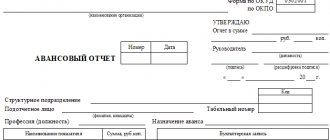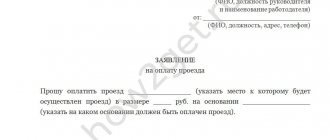How to apply for compensation
Compensation payment for late payment of wages is calculated in accordance with the rules of Article 236 of the Labor Code of the Russian Federation. Labor legislation has established a minimum amount of compensation. The organization has the right to decide that compensation for delayed wages will be paid in an increased amount. Such a decision is approved in a collective agreement or other LNA.
Issue payments by order of the manager and create postings based on it. Familiarize each employee with the order.
Sample order
How else can an employer be punished for delay?
The material losses of a company that fails to pay wages on time are not limited to paying late fees. In addition, if such a fact is revealed by supervisory authorities, the organization may pay a fine in the amounts specified in Part 6 of Art. 5.27 Code of Administrative Offenses of the Russian Federation. If the court satisfies the corresponding claim brought by the employee, the employer may be awarded to pay the amount of moral damage caused to the employee.
If the delay in payment of wages in full exceeds a period of 2 months or in a partial amount of 3 months, the company may face criminal prosecution under Art. 145.1 of the Criminal Code of the Russian Federation. However, in order to apply such a severe punishment, it will be necessary to prove the intent of the owners and management of the company, which in practice is not so simple.
How to calculate
The minimum amount of compensation is calculated based on 1/150 of the Central Bank key rate for each day of delay in transferring wages to an employee. It is calculated on the amount due for transfer to the employee, minus personal income tax and other deductions. To calculate, use the formula:
To simplify calculations, use an online calculator.
Compensation remuneration is calculated starting from the day following the day of the established salary transfer (other accruals under the employment contract) and until the day of actual repayment of the debt. Generate entries for calculating compensation for delayed wages on the date of the order and transfer to employees.
Administrative and criminal liability for delayed payment of wages.
In addition to the liability provided for by the Labor Code of the Russian Federation, the employer bears administrative and criminal liability for non-payment or incomplete payment on time of wages and other amounts within the framework of labor relations.
Administrative responsibility for these acts is established in parts 6, 7 of Art. 5.27 of the Code of Administrative Offenses of the Russian Federation - in the form of a warning (draft bill No. 473887-7 proposed to exclude punishment in the form of a warning from Part 6) or a fine. We will show the size of the sanctions in the table.
| Subject of the offense | Amount of fine, rub. | |
| In case of primary violation (Part 6) | In case of repeated violation (Part 7) | |
| Officials | From 10,000 to 20,000 | From 20,000 to 30,000 |
| IP | From 1,000 to 5,000 | From 10,000 to 30,000 |
| Legal entity | From 30,000 to 50,000 | From 50,000 to 100,000 |
Criminal liability for non-payment of wages threatens the manager if he acted out of selfish or other personal interest (Article 145.1 of the Criminal Code of the Russian Federation). The amount of sanctions is in the table.
| Aspect | Responsibility provided for in Art. 145.1 of the Criminal Code of the Russian Federation | ||
| Part 1 | Part 2 | Part 3 | |
| Composition of the offense | Partial non-payment of more than three months of salary (and other amounts provided by law) | Complete non-payment of wages (and other amounts established by law) for more than two months or payment of wages for more than two months in an amount below the minimum wage | Non-payment (partial or full) of wages entailed serious consequences |
| Measure of responsibility | Fine up to 120,000 rubles. or in the amount of salary (other income of the convicted person) for a period of up to one year. Deprivation of the right to hold certain positions or carry out certain activities for a period of up to one year. Forced labor for up to two years. Imprisonment for up to one year | Fine from 100,000 to 500,000 rubles. or in the amount of salary (other income of the convicted person) for a period of up to three years. Forced labor for a period of up to three years with or without deprivation of the right to hold certain positions or carry out certain activities for a period of up to three years. Imprisonment for a term of up to three years with or without deprivation of the right to hold certain positions or carry out certain activities for a term of up to three years | Fine from 200,000 to 500,000 rubles. or in the amount of salary (other income of the convicted person) for a period of one to three years. Imprisonment for a term of two to five years with or without deprivation of the right to hold certain positions or carry out certain activities for a term of up to five years |
An essential point: both administrative and criminal liability can occur only in the presence of guilt (Article 2.1 of the Code of Administrative Offenses of the Russian Federation, Article 14 of the Criminal Code of the Russian Federation). Non-payment of wages entails criminal liability only if the organization has funds and the non-payment is due to self-interest or other personal interest of the head of the organization (branch, representative office, separate (structural) unit).
What accounting entries appear when calculating and paying compensation?
To reflect settlements with employees for the calculation of compensation amounts, use account 73 of the chart of accounts. In accounting, classify it as other income and expenses. For convenience, the entries when paying compensation for late payment of wages are shown in the table.
| Operation | Debit | Credit |
| Compensation accrued for late transfer of wages | 91 | 73 |
| Fixed tax expense calculated | 99 | 68 |
| Insurance and injury premiums assessed | 91 | 69 |
| Accrued amounts paid to employees | 73 | 50, 51 |
In tax accounting, compensation payments cannot be recognized as expenses (Letter of the Ministry of Finance dated October 31, 2011 No. 03-03-06/2/164).
Legal documents
- Article 236 of the Labor Code of the Russian Federation
- Art. 217 Tax Code of the Russian Federation
- Art. 422 Tax Code of the Russian Federation
- 125-FZ
Compensation for delayed wages: accounting and taxes
Employers must pay their employees wages on time and in full. Moreover, this condition is mandatory and must be included in the employment contract. This is the procedure provided for by the provisions of Articles 56 and 57 of the Labor Code. Apparently, in order to ensure that company management does not put off fulfilling this important responsibility, the legislation has been enriched with, one might say, an “incentive” norm. We are talking about Article 236 of the Labor Code. Its provisions establish that if the employer violates the established deadline for payment of wages, vacation pay, dismissal payments and other payments due to the employee, he is obliged to pay them with interest. The amount of this “fine” is determined based on 1/300 of the refinancing rate of the amount not paid on time for “every day of delay, starting from the next day after the established payment deadline, up to and including the day of actual settlement.” Moreover, the amount of monetary compensation may be increased if this is stipulated by a collective or labor agreement; and the obligation to pay it arises regardless of the employer’s fault.
Example 1
From April 29, 2008, the refinancing rate was set at 10.5% per annum (instruction of the Central Bank of April 28, 2008 No. 1997-U). The employee’s salary according to the staffing table is 6,000 rubles.
Payment of wages was delayed by 13 days. The amount of interest (monetary compensation) will be 27.3 rubles. (RUB 6,000 × 10.5%: 300 × 13).
For profit tax purposes, this type of penalty is not taken into account. The Ministry of Finance directly indicated this in a letter dated April 17, 2008 No. 03-03-05/38. At the same time, representatives of the financial department rejected almost all attempts in any way to “incorporate” such costs into tax expenses.
The first thing that may come to an accountant's mind is to include costs as part of labor costs. But no. On the one hand, these include any accruals to employees in cash and (or) in kind, incentive bonuses, as well as some compensation payments. On the other hand, Article 255 of the Tax Code states that compensation must necessarily be related to the work schedule and working conditions. The Ministry of Finance believes that payments made in accordance with Article 236 of the Labor Code do not meet this requirement under any circumstances.
Dangerous alternative
There is, however, another option for accounting for this type of compensation, but it is quite risky. According to the provisions of Articles 56 and 57 of the Labor Code, delay in earnings is nothing more than a violation of the employment contract. This means that the organization can take into account the corresponding monetary compensation as part of non-operating expenses, referring to subparagraph 13 of paragraph 1 of Article 265 of the Tax Code. This provision stipulates that non-operating expenses include expenses “in the form of fines, penalties and (or) other sanctions recognized by the debtor <...> for violation of contractual or debt obligations, as well as expenses for compensation for damage caused.” There really is logic in this. However, representatives of the Ministry of Finance in the already mentioned letter dated April 17, 2008 No. 03-03-05/38 put an end to this “scheme”. The financiers decided to plunge into the wilds of civil law. They drew attention to the fact that, in accordance with Article 307 of the Civil Code, by virtue of an obligation, one person (debtor) is obliged to perform a certain action in favor of another person (creditor). In this case, obligations arise from the contract, as a result of causing harm and from other grounds specified in the Code, that is, within the framework of civil legal relations. Plus, the amount of monetary compensation paid to an employee for delayed wages may be established by an employment and (or) collective agreement. From all of the above, financiers concluded that the provisions of Article 265 of the Tax Code are simply not applicable to this compensation.
Salary taxes
So, in order to avoid a conflict with the tax office, you need to donate part of your net profit to compensate for delays in paying wages. Let’s figure out how things stand with “salary” taxes in this case. Here, by the way, everything is quite optimistic. According to paragraph 3 of Article 236 of the Tax Code, payments and other remuneration accrued by taxpayers in favor of an individual under an employment contract are not recognized as subject to UST taxation if for taxpayer organizations they are not classified as expenses that reduce the income tax base. It turns out that compensation paid by an organization to an employee for late payment of wages is not subject to Unified Social Tax. It is also not subject to contributions to the Pension Fund and compulsory social insurance against industrial accidents and occupational diseases. This follows from the provisions of paragraph 2 of Article 10 of the Law of December 15, 2001 No. 167-FZ and paragraph 10 of the List of payments for which contributions to the Social Insurance Fund are not charged, approved by Government Decree of July 7, 1999 No. 765.
Now let's deal with personal income tax. The provisions of paragraph 1 of Article 217 of the Tax Code establish that not only state benefits (with the exception of temporary disability benefits, including benefits for caring for a sick child), but also other payments and compensations paid in accordance with current legislation are exempt from this tax. Article 236 of the Labor Code establishes only the minimum amount of compensation, and it applies only if the collective or labor agreement does not provide for other rules for calculating it that are more beneficial for the employee. Thus, if the amount of the “penalty” is paid within the amount specified in the employment or collective agreement, then it is not subject to personal income tax.
Accounting
According to paragraph 11 of PBU 10/99, compensation for delayed payment of wages in accounting is classified as other expenses. Compensations are taken into account in debit 91 “Other income and expenses”, subaccount 91-2 “Other expenses”, in correspondence with account 73 “Settlements with personnel for other operations”. Since this “penalty” is not taken into account when calculating income tax, then, based on paragraphs 4 and 7 of PBU 18/02 “Accounting for income tax calculations,” a permanent difference and a corresponding tax liability arise in accounting. It is reflected in the debit of account 99 “Profits and losses” subaccount “Permanent tax liability”, in correspondence with the credit of account 68 “Calculations for taxes and fees”.
Example 2
Let us assume that the employee is paid compensation in accordance with the employment contract in the amount of 6,000 rubles. The accountant will make the following entries:
Debit 91-2 Credit 73 - 6000 rub. — compensation was accrued for violation of the deadline for payment of wages;
Debit 99 Credit 68 - 1440 rub. — the amount of permanent tax liability is reflected (RUB 6,000 × 24%);
Debit 73 Credit 50 - 6000 rub. - compensation was paid to the employee.
N. Yakovenko, auditor, for the Federal Financial Information Agency









